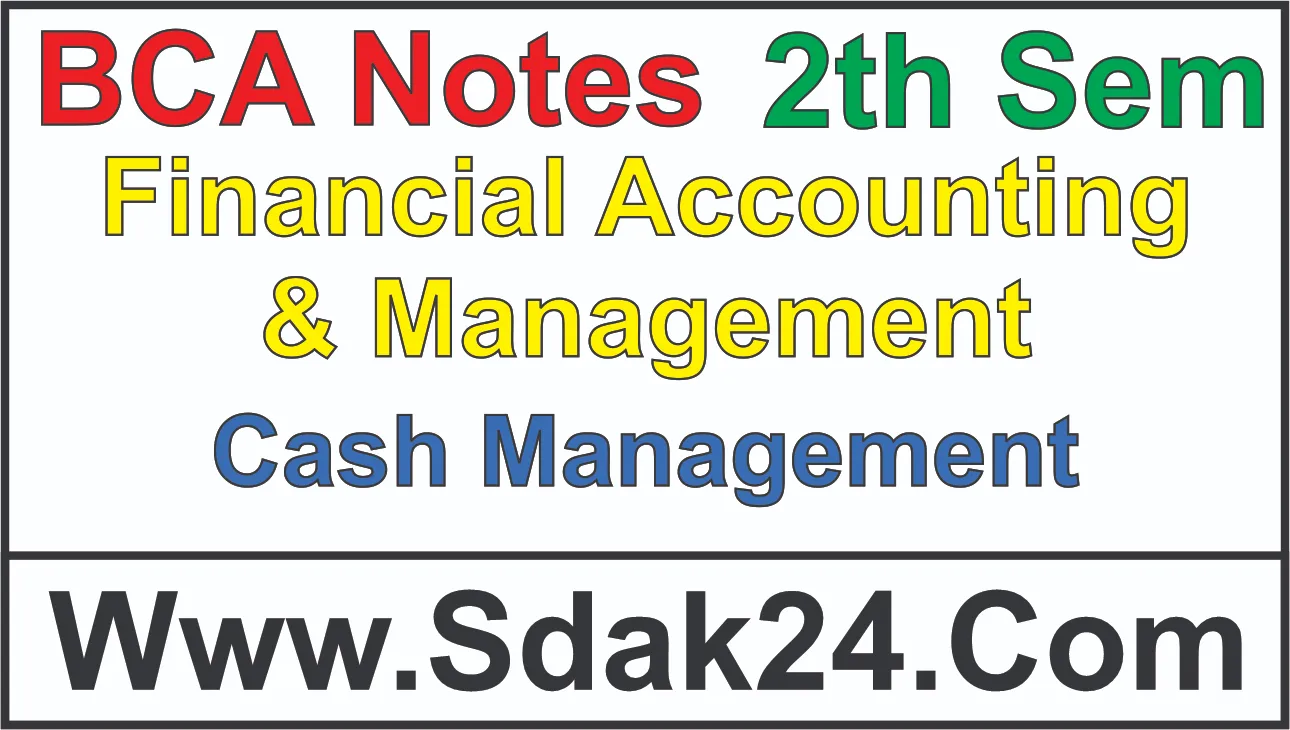Cash Management BCA Notes
Cash Management BCA Notes :–
please wait….
Cash management is a vital aspect of financial management within organizations, including those studied in Bachelor of Computer Applications (BCA) programs. It involves the efficient management of cash flows, ensuring that a company has enough liquidity to meet its short-term obligations while maximizing returns on idle cash. Here’s a comprehensive overview of cash management within the context of a BCA program (Cash Management BCA Notes) :
Importance of Cash Management
- Liquidity Management: Cash management ensures that a company maintains sufficient cash reserves to cover day-to-day operational expenses, such as salaries, rent, and utilities, without relying excessively on external financing.
- Optimizing Cash Flows: By forecasting cash inflows and outflows accurately, organizations can optimize cash flows to minimize idle cash balances and reduce borrowing costs.
- Working Capital Efficiency: Effective cash management is crucial for managing working capital efficiently, ensuring that the right amount of cash is available to support ongoing business operations and growth initiatives.
- Risk Management: It helps mitigate financial risks associated with cash shortages or unexpected expenses by maintaining a buffer of liquid assets.(Cash Management BCA Notes)
Components of Cash Management
- Cash Collection: Efficient collection and processing of receivables from customers to shorten the cash conversion cycle and improve liquidity.
- Cash Disbursement: Managing payments to suppliers and creditors to optimize payment terms and take advantage of discounts while ensuring timely settlement of obligations.
- Cash Forecasting: Utilizing financial data and predictive models to forecast future cash flows accurately, identifying periods of surplus or shortfall in cash balances.
- Cash Budgeting: Developing cash budgets that align with operational and strategic goals, allocating resources effectively to support business objectives. (Cash Management BCA Notes)
Techniques and Strategies in Cash Management
- Float Management: Minimizing the time between cash outflows and inflows to maximize the use of available cash.
- Cash Concentration: Centralizing cash balances into a single account or few accounts to improve visibility and control over cash positions.
- Cash Sweep Mechanisms: Automatically transferring excess cash from operational accounts to investment accounts to earn interest while maintaining liquidity.
- Electronic Funds Transfer (EFT): Using electronic payment systems to streamline cash disbursements and collections, reducing processing times and costs.(Cash Management BCA Notes)
Technological Integration in Cash Management
BCA programs emphasize the integration of technology in cash management processes:
- Financial Software: Learning to use accounting software and enterprise resource planning (ERP) systems for cash flow management, budgeting, and financial reporting.
- Online Banking and Payment Systems: Understanding online banking platforms and electronic payment systems for efficient cash transactions and reconciliation.
- Data Analytics: Applying data analytics tools to analyze historical cash flows and predict future cash requirements accurately.
- Cybersecurity: Addressing cybersecurity measures to protect financial transactions and data privacy in digital cash management.
Career Opportunities in Cash Management
Graduates from BCA programs with expertise in cash management can pursue various career paths:
- Cash Manager: Responsible for overseeing daily cash operations, monitoring cash flows, and optimizing liquidity management strategies.
- Treasury Analyst: Analyzing financial data, managing investments, and forecasting cash flows to support strategic financial decisions.
- Financial Controller: Ensuring compliance with cash management policies and procedures, overseeing financial reporting, and internal controls.
- Financial Consultant: Providing advisory services on cash flow optimization, risk management, and working capital efficiency to client organizations.
- Treasury Manager: Leading treasury functions, including cash management, investments, and banking relationships within large corporations.

|
|
|||